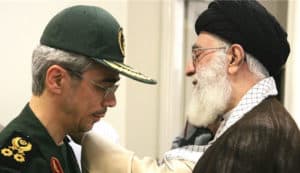
Iran’s Supreme Leader Ali Khamenei appoints Major General Mohammad Bagheri as the new chief of the Armed Forces General Staff, Tehran, June 28, 2016.
Iran’s new Armed Forces General Staff chief, Major General Mohammad Bagheri, was appointed on Tuesday. Defa Press, Iran’s official armed forces media outlet, reprinted on the following day a 2014 interview with Bagheri, in which he reiterated Tehran’s security red lines and priorities, warning that Iran would directly intervene in Iraq if Baghdad were threatened.
“Baghdad, the sacred shrines, and the burial places of the pure Imams in Iraq are all the Islamic Republic’s red lines,” he proclaimed, “if these are endangered, the Islamic Republic will enter action directly and will annihilate the wicked with diligent and strong defense.”
Reassuring Tehran’s allies, Bagheri vowed to support them until victory. “If the interests of our friends and allies are endangered,” he said,” [then] per the directives of the commander in chief we will support the companions of the Iranian nation in any way possible and will provide them with the necessary training to confront any threats.”
“Per the directives of the supreme leader and the Supreme National Security Council, we will undertake actions specific to that place,” announced the senior Islamic Revolutionary Guard Corps (IRGC) commander.
Bagheri then sought to reassure Iranians that the security situations in northwestern and southeastern Iran, where armed forces have been fighting low-level Kurdish and Baluchi separatists, are under control. The armed forces have neutralized kinetic threats despite “the investment of some enemies in neighboring countries in the past three years,” he said, taking a swipe at Saudi Arabia.
“We have given most of the responsibility of providing security to the indigenous population, meaning our Baluchi brothers in the southeast and our Kurdish brothers in the northwest,” claimed Bagheri.
The armed forces have “complete control” over “anti-revolutionary groups” that operate from “the soil of neighboring countries,” said the armed forces chief. In addition, Iran has held several meetings with neighboring governments to reach an appropriate security situation.
The government, armed forces, and the private sector are investing in the development of border areas to create jobs, claimed the senior commander.
Responding to a reporter’s question about plans to arm the West Bank, Bagheri stated, “everything that the supreme leader has ordered has been implemented…certainly this important event will be operationalized soon.”
Bagheri’s appointment to General Staff chief was announced yesterday. The General Staff coordinates between Iran’s unique bifurcate armed forces, the Islamic Revolutionary Guard Corps (IRGC) and the regular Army. The Guard produces most of the senior officers in the General Staff. IRGC Major General Bagheri replaced Hassan Firouzabadi, a close confidant of the supreme leader who has held the post since 1989 and who was appointed to the supreme leader’s senior military adviser.
Bagheri’s appointment is a shake up in the General Staff and follows a series of deputy appointments and reappointments that were announced last week. Bagheri’s prior post was General Staff headquarters and joint affairs deputy, and before that he was deputy of operations and intelligence, his area of expertise.
Since 2007-2008, Bagheri has served as coordination deputy to the Khatam ol Anbia Central Base, considered the highest operations command center that oversees Iranian combat units (formed during a major battle in the Iran-Iraq War to coordinate between the IRGC and Army operations command centers, and later commanded all combat units including revolutionary committee and law enforcement. It has continued to function in the post-war era and appears to fall under the General Staff).
His older brother, Hassan, was an important commander during the Iran-Iraq war who was killed in combat in 1983. Hassan founded the IRGC’s intelligence and operations division, and Mohammad served at his assistant. A decorated veteran, Mohammad commanded his own units during the war and has had a distinguished career in the Guard.
Mohammad Bagheri is part of the IRGC “Command Network,” referred to Guard commanders who served together in the Iran-Iraq War and have risen to occupy important posts and dominate the Islamic Republic’s security and military apparatus.
Bagheri has also said that he was part of the “second layer” of students who took over the US Embassy in November 1979.
Update (July 2): It was reported that Bagheri held a senior post in the Khatam ol Anbia Construction Base, the Guard’s engineering arm. He has served in the Khatam ol Anbia Central Base, a distinct unit.








1 Comment
This appointment is not some simple bureaucratic reshuffling. It represents a significant change in regime policy to put the nation’s military and police services firmly in the hands of the IRGC and away from the regular army. It places the most politicized unit of the military, which already controls wide swathes of Iran’s economy, at the top of the pyramid in terms of raw power.